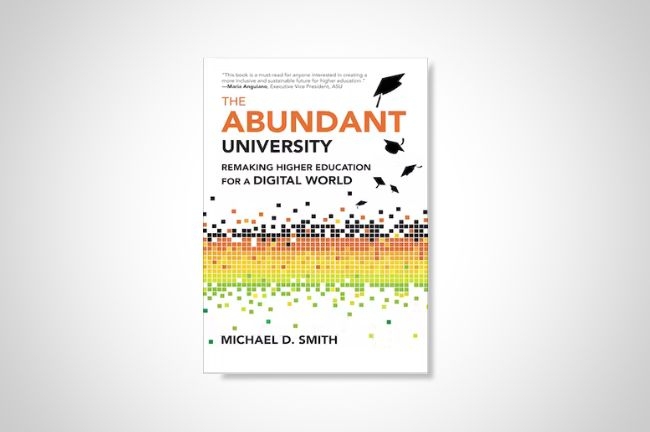You have /5 articles left.
Sign up for a free account or log in.

MIT Press
After reading (and reviewing) Michael Smith’s new book, The Abundant University, I had some questions. Fortunately, Smith, a professor of information technology and public policy at Carnegie Mellon University, was willing to provide some answers.
Q: Up until now, your research has been on markets for digital information and digital media products. What made you decide to write about universities and online education?

A: You’re right—I spent most of my career studying how new technologies change structure and competition in industries, most recently the entertainment industry. On one hand, that’s an odd starting point to talk about education. On the other hand, I think it gives me a unique perspective on why industry insiders tend to dismiss change and how to get beyond that natural instinct.
Indeed, I decided to write this book after hearing friends and colleagues in higher ed dismiss change in ways that sounded remarkably similar to what I’d heard from leaders in the entertainment industry: “the same six studios have dominated my industry for the last 100 years and that’s not going to change; people will give up food and a roof over their heads before they give up cable television; no one is going to listen to the shitty sound quality of MP3s.”
The point of this argument is we in higher education can learn something from how other industries have faced similar changes.
Q: In the book, you ground your arguments for universities prioritizing online education as a moral case for action. Can you synthesize that central argument from the book?
A: What I quickly realized is that there is a large swath of higher education that is never going to listen to an argument grounded in technological change. “A professor must have an incentive to adopt new technology,” a colleague recently told me. “‘I am a tenured old fart and can simply wait out this shock until retirement.’ Innovation adoption will occur one funeral at a time.”
Wrestling with that pushback led me to two economic facts about our current “scarcity-based” system of higher education: gaining an elite four-year degree is key to becoming wealthy, and being born into wealth is key to gaining an elite four-year degree. Of course, those facts create a feedback loop that perpetuates and exacerbates socioeconomic inequality. But it’s worse than that: the problems are systemic, which means we aren’t going to solve them by simply tweaking the existing system.
What we need is a new system of higher education, not as a replacement for residential colleges, but as a viable alternative for the many students who today are left behind.
In short, I realized that the key message isn’t that new technologies will change higher education. The key message is that if we in higher education care about social justice as much as we say we do, we should want to embrace this change.
Q: In my review, I take you (gently) to task for not fully articulating the differences between traditional online education and a new variant of scaled online education. I also comment on what I found to be an insufficient critical analysis of universities working with for-profit companies in the online space. How do you address these critiques?
A: Those are entirely fair critiques.
I decided not to go into more detail on those and other educational options because I wanted to give just enough examples of ways new technologies can create opportunities for students who otherwise would be left behind, that my colleagues could see the potential—and indeed the necessity—for these new technologies to be at the center of a system of higher education based on abundance rather than scarcity.
Once I showed them that potential, I wanted to move quickly to how we can achieve that potential: by shifting from protecting our model of education to embracing how new technologies can help us achieve our mission as educators.




